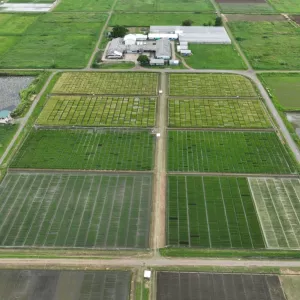Advancing Direct-Seeded Rice with Modern Phenotyping Facilities
By Dr. Shalabh Dixit, Xenina Ibabao, Myrtel Valenzuela Aerial view of IRRI’s direct-seeded rice phenotyping facility at its headquarters in Los Baños, Philippines. IRRI has revolutionized rice breeding for direct-seeded rice (DSR) systems by establishing state-of-the-art phenotyping facilities in Kenya, India, and the Philippines. These hubs promote sustainability and climate resilience for smallholder farmers in Asia and Africa while speeding

Advancing Direct-Seeded Rice with Modern Phenotyping Facilities
By Dr. Shalabh Dixit, Xenina Ibabao, Myrtel Valenzuela
IRRI has revolutionized rice breeding for direct-seeded rice (DSR) systems by establishing state-of-the-art phenotyping facilities in Kenya, India, and the Philippines. These hubs promote sustainability and climate resilience for smallholder farmers in Asia and Africa while speeding up the creation of high-yielding rice varieties by integrating mechanized planting, automated irrigation, and precision monitoring.
More farmers are using direct-seeded rice (DSR) instead of traditional transplanting due to growing labor expenses and water scarcity. While DSR offers practical advantages, developing rice varieties suited for this system has been challenging. High labor demand, limited mechanization, and uncontrolled field conditions have slowed the breeding of high-yielding, resilient varieties.
To help address this, the International Rice Research Institute (IRRI) initiated a breeding program to develop high-yielding varieties adapted to DSR systems. In the past, a key limitation of DSR breeding was the lack of adequate phenotyping facilities capable of screening large breeding populations. Phenotyping, which is essential for understanding how rice plants respond to stress, plays a critical role in helping plant breeders identify varieties that can better withstand challenging conditions.
To overcome this bottleneck, IRRI has now established state-of-the-art phenotyping facilities. Led by Dr. Shalabh Dixit, who also established and heads the institute’s DSR Breeding Program, these hubs in the Philippines, India, and Kenya provide researchers with advanced screening tools to develop rice varieties suited to real-world farming conditions.

